The Childhood Strengths of Every Myers-Briggs® Personality Type
Each child in the world is a blessing, and each child develops their personality type in different ways. But what unique gifts are we first to see in children? What abilities tend to show up at the youngest age that are related to their personality type? Let’s take a look!
Not sure what your child’s personality type is? Take our new questionnaire here.
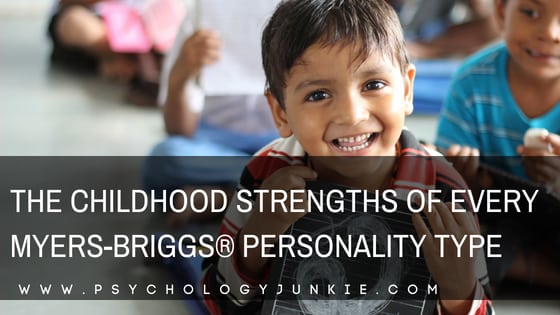
Table of contents
Estimated reading time: 13 minutes
The Childhood Strengths of Each Personality Type
ISTJ Children
Attentiveness is one of the first things you’ll notice about ISTJ children. Even from infancy, they have an ability to observe their environment in an intense, thorough way. They are good at sizing up situations, noticing details, and thoughtfully considering what’s happening around them. They are generally cautious, calm, and intense babies who grow into careful, methodical, and loyal children. They usually have high standards for themselves and are hard workers, getting their homework done on time and completing chores without having to be reminded every single day. They tend to think ahead about their goals for life and work steadily in that direction, even as children. In decisions, they are logical, fair, and focused on justice. Their down-to-earth, reasonable nature is very appreciated by their parents.
Find out about the struggles of ISTJ children here.
ISFJ Children
A gentle and cautious nature is one of the first things you’ll notice about ISFJ children. From infancy onwards they carefully observe their surroundings, watching from the sidelines before jumping right into anything. They are very considerate of the people around them and very tuned into how people feel. When their parents or siblings are happy and smiling, most likely they will be happy and smiling as well. They prize consistency and are usually very responsible children, doing their homework before playing and helping out with younger siblings. They are also very down-to-earth and reasonable, seeing the world for what it is and making the most of resources. They are very caring and attached to their families and will go out of their way to help anyone who needs it. Their kind, reasonable nature is a balm to many in their families. Find out more about ISFJ children here.
ESTJ Children
ESTJ children want to learn how to do everything for themselves. One of the first things you’ll notice about an ESTJ baby is their desire to crawl, walk, climb, dress themselves, and feed themselves as soon as possible. They want to prove their competence and they want to be in control of their atmosphere. As such, they are good at organizing things; whether it’s blocks, dolls, or even friends. They tend to appear a little bossy as children, but that’s partially thanks to their natural ability to take charge of a situation and see efficient, logical ways to do things (although sometimes they need to be told to let other people lead). Young ESTJs are very practical, reasonable, and logical. They strive to be fair and responsible and are usually good at keeping up with their homework and chores without a lot of nagging or persuasion from parents. Their confident, fair-minded nature is strength in their families.
ESFJ Children
A sunny, friendly enthusiasm is one of the first things you’ll notice about ESFJ children. From infancy onwards, they seem to have a natural love for people and a desire for companionship. Their practical, empathetic nature is charming at a young age. You might find an adult talking to a little ESFJ and the ESFJ nodding emphatically and saying, “Oh, I understand, yes I do” about something that is far more grown-up than most children would understand. Being affirmed and affirming others is a core drive for this type; they enjoy finding out how they identify with others and puzzling over the ways they don’t. They are usually good at organizing things and tend to take charge of social situations with their friends, making sure everyone is having fun and is obeying the rules. As Feeling-Judgers, they prize getting things done and meeting the expectations of their parents or teachers. They will likely finish their homework quickly and help out with younger siblings; in fact, many times there’s an “oldest child” vibe about them even if they aren’t the oldest.
Find out about the struggles ESFJ children experience here.
ISTP Children
A strong desire for independence is one of the first things you’ll notice about ISTP children. In infancy they tend to push themselves physically to do things ahead of schedule; whether it’s rolling over, crawling, standing, or walking. They like to challenge themselves and are usually gifted at fine-motor activities like shape-sorting or building with Legos. Driven by curiosity, they have a calm courage that is allows them to take risks without fear, whether it’s climbing the tallest tree or biking down a steep hill. While they may be wary of other people, they are usually eager to jump right into experimenting with objects and learning how they are built and how they work. They tend to figure out how things work easily and early on. In decisions they are usually detached, logical, and reasonable. They are, in fact, one of the most realistic personality types out there, and you will see this in childhood. They are less likely to play pretend and more likely to play baseball or climb a tree or carve something. Their calm, rational nature is appreciated in many families.
ISFP Children
One of the first things you’ll notice about ISFP children is their sweet-hearted, sensitive nature. Even as babies they tend to be very loving and devoted to their families and ready to snuggle and spend quiet time together. As they get older they develop a natural interest in crafts or music. Many little ISFPs develop a skill for dancing or singing along to their favorite songs, while others enjoy dabbling with clay, paints, and creative materials. They are very curious, tactile children who like to touch and experiment with things and figure out how objects work. Sometimes they will break their toys just so that they can figure out how everything fits together! They tend to excel as they get older in hands-on, practical fields or creative pursuits. Along with their skill with practical application, little ISFPs care about being true to themselves. While they don’t like conflict, they can be very stubborn about their values and anyone who tries to change them. Their creativity, authenticity, and sensitivity brings joy and warmth to many families.
ESTP Children
One of the first things you’ll notice about ESTP children is their abundant energy and their impulsive, adventurous nature. They are constantly challenging themselves physically and trying to test the limits of their environment. They’ll climb out of their cribs far younger than most other children, and they’ll try to jump as soon as they learn to walk. Curious and tactile, they want to know how everything works and is put together. They are also gifted storytellers and are quick to develop their own engaging sense of humor. Along with this, they have a logical, analytical nature that makes them sharp debaters and effective troubleshooters. They may go from scaling mountains to hiding away in their rooms reading about survival skills (an area that tends to naturally draw their interest). Their thirst for adventure and their affable, humorous nature makes them the liveliest members of many families.
ESFP Children
One of the first things you’ll notice about ESFP children is their liveliness and their sweet, affectionate nature. They live for the moment and enjoy challenging themselves early to crawl, walk, run, climb and explore. Verbally quick, they often speak early and get a thrill from sharing stories, making people laugh, and asking lots of questions! They have a gift for making the most of every moment and seeing opportunities that other people miss. Because of their sensing nature, ESFPs are practically minded and realistic, seeing the world for what it is and seeing ways things can be used that other people might miss. They enjoy touching things, taking things apart, and creating crafts. They also tend to have a knack for picking up songs, musical instruments, and dance moves. Their passion, energy, and zest for life makes them a welcome glimmer of sunshine in any home.
INTJ Children
INTJ children seek independence and knowledge from a very early age. They are usually quick to pick up difficult, elaborate words and are also typically early readers. Underneath their reserved, private demeanor they have a wealth of ideas and spend a lot of time pondering the meaning of everything they see. They usually ask complex questions and have an ability to grasp more theoretical topics than many children their age. Both logical and creative, they enjoy innovating, looking at things from unusual perspectives, and experimenting with writing or art. They will seek independence, knowledge, and understanding most of their life, stretching themselves to do more and more grown-up things every day. As Intuitive-Judgers, they have big ideas and are comfortable being skeptical and questioning rules, traditions, or beliefs that they feel are nonsensical. Their skepticism helps them to root out what’s true and what’s not. While it can be exasperating for some parents it’s really a gift that can help them chase down new discoveries later in life. Find out more about INTJ children here.
INFJ Children
One of the first things you’ll notice about young INFJs is their pensive yet warm nature. They always seem to be asking themselves big questions, and eventually many of these questions seep out around their families. “Why was I born?” “Who made the world?” “Why do we die” “What does love mean?”
Things that other children take at face-value, young INFJs question and seek to understand. Parents can think that they are over-complicating things by asking so many questions, but they use this knowledge to have a deeper understanding of what life is really all about. Along with being questioning and thoughtful, young INFJs are highly creative and empathetic. They pick up the moods of their friends and family members easily and are usually sensitive to the needs of others. Blessed with a bountiful imagination, INFJs love reading and pick it up earlier than many types. They also are drawn to creative writing and art, where they can get their original ideas out on paper. Overall, their kind-hearted, imaginative nature is an enlightening ingredient in their family life. Find out more about INFJ children here.
ENTJ Children
One of the first things you’ll notice about ENTJ children is the certainty with which they express themselves. They are usually confident, inventive, and curious; unafraid to test themselves and eager to prove their own competence. Usually early talkers, they tend to be argumentative and curious – questioning rules and boundaries that get in the way of their autonomy. They get quickly bored of the same old toys and will always seek out new, novel toys and creative supplies that allow them to be imaginative. As Thinking-Judging types, they prefer to think with their head rather than their heart most of the time. They are usually quick to pick up on logical truths and are ready to argue anything that doesn’t seem logical. Putting their research to use is important to them, and they enjoy amassing information that they can use to go after their goals. Independence and competence is a major focus of these children. Whether they’re learning to tie their own shoes, ride their own bike, or drive a car, chances are, they’ll push themselves to do it as quickly as possible. Parents may wish they weren’t in such a hurry to grow up, but this fierce independence is one of the factors that drives them to achieve great things in life.
ENFJ Children
One of the first things you’ll notice about young ENFJs is their natural enthusiasm, friendliness, and empathy. Even as young children they seem to be drawn to nurturing others; whether it’s through sharing their toys, comforting a child who is crying, or helping out a younger sibling who is struggling to read. They are usually gifted with emotional awareness and a considerate, warm-hearted nature. Along with this, they tend to be good at picking up words and have rich, nuanced vocabularies at a very young age. Imagination is imbued into each of the ENFJ‘s activities. Whether they’re telling stories or directing plays, they enjoy thinking up possibilities and creative ideas. They are usually good at getting their work done on time, meeting deadlines, and fulfilling responsibilities around the house. When they know their loved ones are counting on them they take their duties very seriously. Their enthusiastic, warm-hearted nature is a delight in any family. Find out more about ENFJs here.
INTP Children
One of the first things you’ll notice about INTP children is their curiosity and analytical nature. They always seem a bit detached from the world around them, quietly considering everything they see and trying to figure out what it all means. Often they pursue their curiosity by taking things apart around the house and then trying to put them back together. They are usually very logical and independent, wanting to prove themselves capable of doing things without help. Often gifted with language, they strive to pick up very precise words to describe their thoughts. They also tend to have a knack for understanding brain-teasers, puzzle toys, and other open-ended activities that they can be creative with. Skepticism comes naturally to young INTPs, and though their argumentativeness may frustrate more authoritative parents, their questions often reveal truths and meanings that other children would not have thought of at so young an age. Overall, the INTPs inquisitive, investigative nature is intriguing and eye-opening to many families. Find out more about INTP children here.
INFP Children
One of the first things you’ll notice about young INFPs is their inner resolve, sensitivity, and vivid imagination. They love fairytales and stories where good overcomes evil, even if they find themselves occasionally empathizing with misunderstood villains. Language tends to come early to little INFPs, who love to read as well as write. These children love to imagine the future, and they have very creative ideas about what could happen or how things can be creatively used. They are very sensitive children, not only to their own feelings, but the feelings of others. They hate to see anyone mistreated and will stick up for misfits and outcasts as a matter of conviction. When they look at the world they see many perspectives and angles that are unusual and innovative. Thought often soft-spoken, young INFPs aren’t opposed to questioning a rule or belief that seems contradictory to their own values. They are deeply passionate and enjoy using art, creative writing, or spirituality to express their deep feelings. Find out more about INFP children here.
ENTP Children
Young ENTPs are recognized by their imaginative, curious, and intellectual nature. They are enthusiastic and love being around people and asking lots of questions and posing lots of alternative ideas. Though they may not be the earliest walkers or talkers, they are often quick to learn to read and enjoy immersing themselves in fantasy stories, science-fiction books, and theoretical expositions. They are intensely logical and don’t mind mentally sparring with adults over an idea that seems outdated or unreasonable to them. They rarely do so with ill-intent, but it can rub authority figures the wrong way. The imagination of young ENTPs is limitless in its scope. They come up with great make-believe play ideas and make enthusiastic leaders for their ideas and inventions. They like to figure out new ways of doing everything; from homework to making money (an activity which naturally appeals to them). Their creativity and desire for originality makes them fascinating children who inevitably keep their parents on their toes.
ENFP Children
One of the first things you’ll notice about young ENFPs is their insatiable curiosity and rich enthusiasm for life. These youngsters are full of ideas, questions, and energy. Even as babies, they are eager to get into paints, pens, keys, or any grown-up objects that seem unattainable and therefore deeply compelling. They are usually early talkers, eager to express their feelings and passions to their family members. They are drawn to creative pursuits; art, drama, music, anything that is open-ended and allows them to explore without limits. They also love to be read to, especially stories that are fantastical or mythical in nature.
One of the contradictory characteristics of young ENFPs is their natural sweetness, yet their simultaneously argumentative nature. They see everything from so many perspectives and angles that they have difficulty accepting traditions or conventional beliefs and behaviors that seem outdated or narrow-minded to them. Overall, young ENFPs open the eyes of their families to new ideas, theories, and perspectives that are enlightening and inspiring.
Related: Can Childhood Trauma Impact Your Personality Type
Want to Find Out Your Child’s Personality Type?
Get a questionnaire and an in-depth course on understanding your child’s personality type here.
This article contains affiliate links.
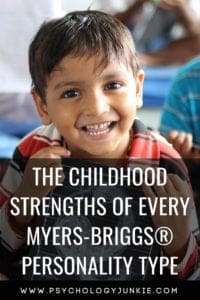
Subscribe to Our Newsletter

Want to discover more about personality type? Get the inside scoop with Susan Storm on all things typological, along with special subscriber freebies, and discounts on new eBooks and courses! Join our newsletter today!





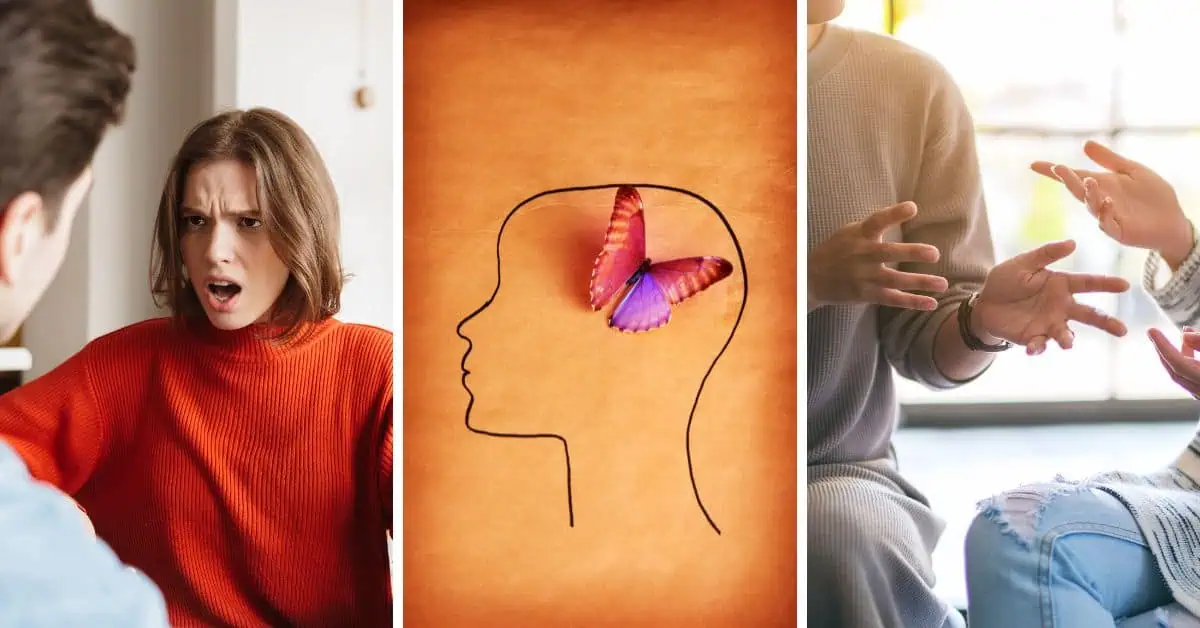
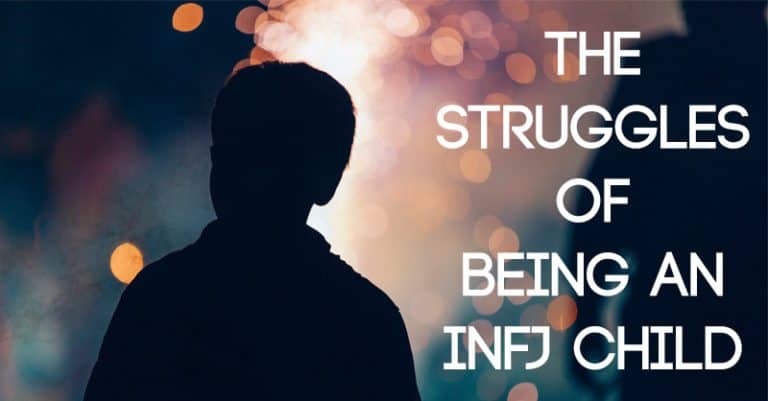
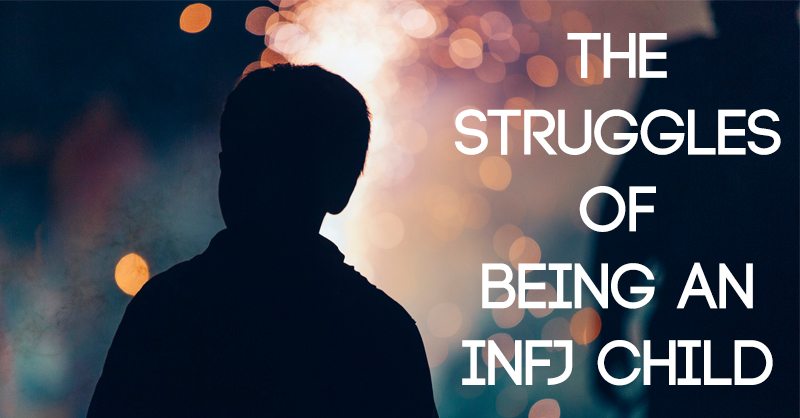



What if this is our dream world and our dreams are the real world?
What if Hitler didn’t die?
“Why am I here? I do not belong here”.
And indeed the “why am I born?” and “Why do we live?”
INFJ and I asked these questions around 4-5 years old. Born in a family who never understood me as most of the people.